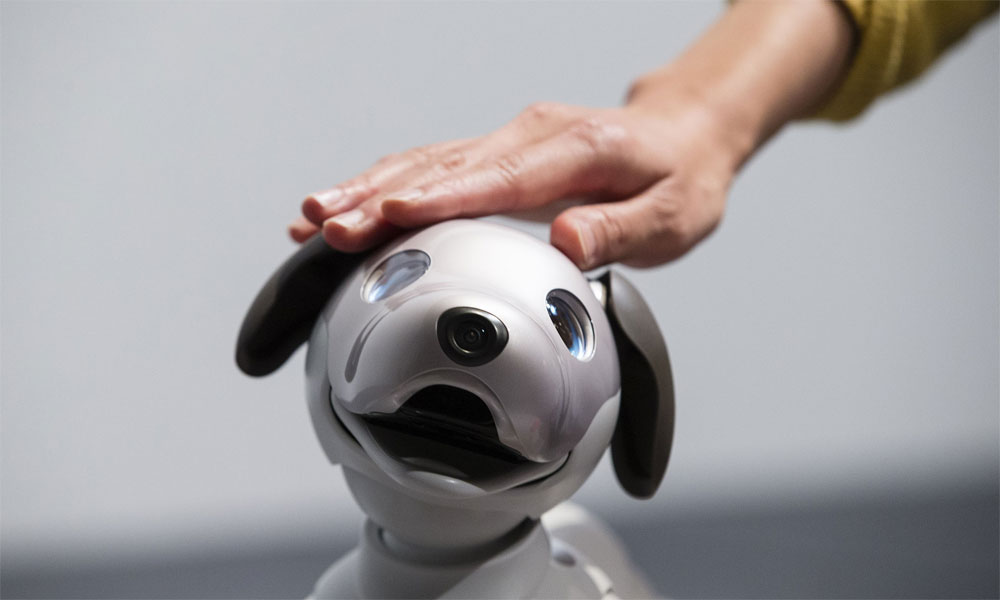University Explains How AI Pets Can Help People With Hearing Loss

Researchers from the University of Cincinnati have discovered that AI robots will help sufferers with listening to loss. Art and pet remedy can heal these with bodily or psychological problems. However, the therapeutic often stops after the affected person’s remedy classes finish.
The analysis group needed to unravel this downside by making a method to observe self-guided remedy. The multidisciplinary collaborative examine by UC researchers analyzed how an artwork remedy app and robotic pets boosted sufferers’ moods.
UC’s Soma Sengupta, MD, Ph.D., mentioned the pandemic lockdowns prompted the remedy app concept. During this time, sure sufferers, comparable to these with brain tumors, couldn’t attend hospital artwork remedy classes. Also, their remedy canine and trainers couldn’t come inside, which left these sufferers with just about no choices.
“You know it’s really depressing that all these people that depended on these therapies during the pandemic couldn’t get anything in person,” mentioned Sengupta, affiliate professor and Harold C. Schott Endowed Chair of Molecular Therapeutics within the Department of Neurology. “Why don’t we develop something that is independent of people physically having to be there or an animal physically having to visit a home?”
Combining AI Pets and Art Therapy to Heal
Sengupta’s analysis targeted on sufferers with vestibular schwannoma or acoustic neuromas. These benign tumors develop on nerves touring from the inside ear to the brain. Because of the tumors, many of those sufferers endure some extent of listening to loss.
For occasion, affected person Sankhya Jejurikar suffers from deafness in a single ear attributable to a benign tumor eliminated in September 2020. The everlasting listening to loss additionally left emotional scars, as Sankhya says she typically feels depressed and remoted.
“In a big crowd when everybody’s laughing at a joke, and you’ve not heard it, you feel frustration, anger and realize that sometimes your friends forget,” Jejurikar mentioned.
After her profitable surgical procedure, she determined to offer again to the medical neighborhood by collaborating within the examine. Since Jejurikar works as knowledgeable artist, the examine was proper up her alley.
Jejurikar mentioned this:
“I said that’s great because as an artist I hope to be of some help to them, given the experience of going through the surgery and having acoustic neuroma and now having one-sided deafness. And the fact that it was art therapy was absolutely the cherry on top for sure.”
For the examine, Sengupta partnered with Claudia B. Rebola, Ph.D., affiliate dean for analysis, affiliate professor, and director of the brand new Center for DAAP Research and Innovation (CDRI) on Health and Wellbeing.
They’d beforehand collaborated on a music remedy app and started work on an artwork remedy app as effectively. Rebola additionally labored tirelessly on enhancing robotic pets for older adults who want a companion however can’t look after an actual animal. Specifically, she improved features the place pets might monitor sufferers’ very important indicators or present further care.
Meera Rastogi, Ph.D., a psychologist, artwork therapist, program coordinator for the pre-art remedy certificates program, and professor on the University of Cincinnati, Clermont College, additionally participated to assist design the artwork remedy prompts for the app.
The Collaborative Study Also Included:
- Diego Gomez Enriquez, DAAP grasp of design candidate
- Iris Lachnit, visiting scholar and scientific psychologist
- Abigail Koehler, scientific analysis skilled
- Jamie Denlinger, UC Brain Tumor Center nurse navigator
- Yehudit Rothman, neuro-oncology doctor assistant
- Peirce Johnston, MD, UC Department of Psychiatry
The Study on How AI Pets Can Help People With Hearing Loss
The group developed a 12-week pilot study to investigate how artwork remedy impacted sufferers’ moods. Psychologists Rastogi and Johnston will monitor the sufferers’ views and well-being with self-reported assessments.
“It’s more than just interacting with art materials. They’re specifically designed art activities to help people think about whatever issues they’re facing in a different way,” Rastogi mentioned. “So it’s interactive through the app and would be similar to the type of art activities an art therapist would ask their clients to do, as well as reflection questions to think and write about after they do the artwork.”
Participants within the examine will meet with an artwork therapist for directions on utilizing specified artwork instruments. Each will obtain a sketchbook and a 24-pack of coloured pencils. The contributors may also seek the advice of with medical employees to discover ways to use the artwork remedy app.
People With Hearing Loss Will Also Take a Pet Home
In addition, the group will give half the sufferers robotic remedy canine to make use of at house.
“Each pet will have a smart bandana, with sensors that help us monitor the number and length of interactions that the user has with the pet,” Rebola mentioned. “So our hope is to quantify and correlate how much they interact with the pet and how their well-being performs through a 12-week study.”
Jejurikar labored with Rastogi and different psychologists to create questions and prompts for contributors in the course of the examine. She helped tailor the questions towards listening to loss sufferers by eliminating questions on most cancers, for instance, since these sufferers have benign tumors.
Researchers say that whereas their focus is treating vestibular schwannoma, additionally they wish to handle sufferers’ psychological well being.
“It’s not so much about cure, but treatment,” Rebola mentioned. “How can we elevate the health and well-being of our patients through alternative interventions?”
Patient and artist Jejurikar mentioned that she’s glad to see the sufferers’ total well-being thought-about within the examine.
“The fact that Dr. Sengupta and her team have actually thought beyond just the physical correction of the surgery but also the emotional problems that come after, I think that’s the future of medicine,” Jejurikar mentioned. “For them to work on it and think about the patients after the surgery really made me feel like I was at the right place. I’ve come to the right place and the right team.”
Future Research on Therapeutic Methods for Loss of Hearing
Sengupta famous the examine might have wide-ranging implications past the listening to loss inhabitants. For instance, most cancers sufferers, these with neurodegenerative illnesses, and other people with psychological diseases might all profit from self-guided, at-home remedy.
“It is important to design technologies that allow people to take care of their health with their own hands,” Rebola mentioned. “And in an indirect way, it’s kind of responding to the needs of having more equitable access to health and distributing and having the users have control of their health.”
The group is presently recruiting sufferers for the pilot examine and plans to publish preliminary findings shortly after. Future research may additionally analyze how sufferers reply to different therapies, comparable to finishing artwork with tablets or interacting with extra superior robot pets.
“We’re designing things as ways of understanding,” Rebola mentioned. “It’s something we don’t do much in the sciences. We’re learning through this iteration, having an impact, generating the second generation.”
The Jejurikar Fund for Vestibular Schwannoma Research and the Harold C. Schott Chair helped fund the examine.
Final Thoughts on How AI Pets and Art Help Those With Hearing Loss
As science advances, new applied sciences and therapies emerge to enhance sufferers’ well being. Researchers have devised an artwork remedy app and given sufferers robotic remedy canine to investigate how they influence sufferers with listening to loss. Hopefully, the examine will succeed, and the group can transfer ahead with remedy plans.












